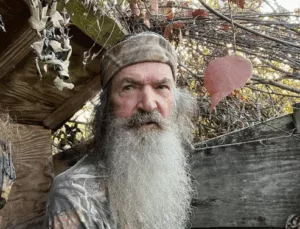Concern had long been stoked by Phil Robertson’s lack of recent public appearances, but his son Jase’s candid update on the family podcast finally allayed those suspicions. With remarkable earnestness, Jase stated bluntly, “Not good.” For those who have followed the Robertson family for years—many of whom view Phil as both an icon and a moral compass—that candid admission has struck a deep chord.

Robertson’s fight has changed from political commentary to something much more personal and delicate—memory itself—since he was diagnosed with Alzheimer’s disease. The patriarch who once enthralled millions with his spontaneous wisdom and audacious statements now finds it difficult to remember recent discussions, a tragic deterioration that has noticeably accelerated in the last 12 months.
Phil Robertson – Key Information Table
| Full Name | Phil Alexander Robertson |
|---|---|
| Date of Birth | April 24, 1946 |
| Age | 78 |
| Birthplace | Vivian, Louisiana, USA |
| Nationality | American |
| Occupation | TV Personality, Businessman, Author |
| Known For | Founder of Duck Commander, “Duck Dynasty” |
| Spouse | Marsha Kay Robertson (Miss Kay) |
| Children | Alan, Jase, Willie, and Jep Robertson |
| Notable Work | “Happy, Happy, Happy”, “The Theft of America’s Soul” |
| Recent Health News | Diagnosed with Alzheimer’s, blood disorder |
| Source | Phil Robertson Health Update |
Jase gave a strikingly concise summary of the diagnosis during an episode of the family’s podcast, “Unashamed,” where the news was revealed. He clarified that Alzheimer’s is getting worse. It has started to disrupt everyday activities, depriving Phil of not only his independence but also the foundation of who he is. Anecdotal forgetfulness has evolved into a daily struggle.
But memory loss is not the end of the story. He was also diagnosed with an unidentified blood disease in recent months, which is an additional complication that has drastically diminished his physical endurance. Jase characterized his father’s condition as “really struggling” by December, describing excruciating pain that made it obvious that even walking was uncomfortable. His voice trembled occasionally, not because of drama but rather because of the weariness from grief and caring for others.
The timing of this moment is especially poignant. The Robertson family is getting ready for their eagerly awaited television comeback. A&E’s “Duck Dynasty: The Revival” will premiere this summer and will feature a scripted fusion of faith, family, and business, bringing together both new and old characters. With well-known characters like Uncle Si and Miss Kay returning to the cast, Willie and Korie Robertson are at the forefront of the reboot. Phil will be conspicuously absent, though.
This absence is significant. Phil was the driving force behind the original series, which ran from 2012 to 2017. The show’s genuineness was anchored by his unvarnished commentary, his steadfast devotion to his family, and his strong Christian beliefs. Removing Phil from the center feels different to many people than removing a log cabin’s foundation, even though it still stands.
Fans are aware of that distinction. Every day, messages flood social media, many of which inquire about Phil’s well-being. Despite being inundated with these inquiries, Jase has taken a straightforward but circumspect stance. “We’re doing the best we can,” he says. These days, it’s not just about Phil; it’s also about Miss Kay, who had a recent, dangerous fall that made the family think they might lose her.
The family nevertheless finds resiliency in one another in spite of these difficulties. According to reports, Kay, 77, has significantly improved in recent weeks. Her resilience, which stems from years of raising her family in the face of intense public scrutiny, seems remarkably resilient. Where necessary, their kids and grandkids—many of whom are now involved in profitable businesses and ministries—are filling in.
Even though Phil is no longer in the spotlight, efforts are being made to preserve his legacy. The family is putting a lot of effort into keeping his presence palpable through faith-based initiatives, book reprints, and podcast segments that tell old tales. Documenting memories before they completely fade into silence is a calculated but intensely emotional endeavor.
A larger cultural struggle with aging and chronic illness is also reflected in Phil Robertson’s journey. Over 6 million Americans suffer from Alzheimer’s, a startling statistic that emphasizes the value of early detection and long-term support networks. His case, which was made public, has brought to light the invisible costs of these illnesses, which affect not only the individual who has been diagnosed but also those around them.
Phil’s current situation is similar to that of other public figures who have been open about dementia in many ways. From Bruce Willis’s recent frontotemporal dementia diagnosis to Glen Campbell’s last tour with Alzheimer’s, the stigma associated with brain decline is being reduced—not completely eliminated, but weakened by candid discussion. Reluctantly, Phil has joined this chorus.
The transparency of the family has been especially helpful to religious communities, many of whom continue to struggle with balancing seeking medical assistance with preserving spiritual hope. The Robertsons are changing the conversation about illness in conservative circles by combining the two. They do not disregard science when they pray. They weep without giving up hope.
It is important to keep in mind that Phil was making headlines for completely different reasons only a few years ago. His divisive and controversial comments in GQ in 2013 almost destroyed the family’s reputation. He was suspended by A&E but returned due to public demand. The incident sparked a national conversation about media censorship and freedom of speech, which Phil embraced with the same ferocity that characterized his hunting stories and duck calls.
The man who was once involved in controversy is now merely attempting to maintain peace. In stark contrast to the stout figure who once bounded onto television screens with a beard as iconic as his sermons, there is a tenderness in that change—a rare, quiet vulnerability.
There is also a significant instance of personal reconciliation in Phil’s story. He found out in 2020 that he had a daughter from a long-term affair named Phyllis. Phil embraced her instead of denying or avoiding her. She almost immediately became a part of the family story, showing that personal development is still possible even in old age.
In many respects, Phil Robertson’s life has come full circle as the family gets ready for a private service and public celebration—should the worst happen. From Louisiana woods duck blinds to the mainstream media, from scandal to forgiveness, from strength to weakness, his journey provides insight into the changing nature of fame, faith, and manhood.
